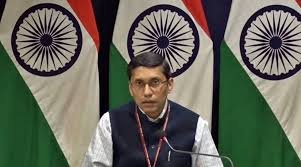India Rejects U.S. Report on International Religious Freedom, Calls it MisinformationThe Indian Ministry of External Affairs has dismissed the latest report on International Religious Freedom released by the U.S. government. The ministry argued that the report was based on misinformation and criticized the statements made by U.S. officials as being motivated. However, it also emphasized that India values its partnership with the United States and expressed a commitment to continue having frank exchanges on the issues involved.
In a statement issued on Tuesday, the spokesperson for the Ministry of External Affairs, Arindam Bagchi, acknowledged the release of the U.S. State Department’s 2022 report. However, he expressed regret that such reports persistently rely on misinformation and flawed understanding. This criticism was in reference to previous reports by the U.S. State Department and the U.S. Commission for International Religious Freedom, both of which had previously raised concerns about religious freedom in India.
The Indian government’s rejection of the U.S. report is not entirely surprising, as it aligns with their stance on previous assessments made by international organizations. India has consistently maintained that these reports fail to capture the true picture of religious freedom in the country. The government argues that the reports tend to overlook the complexities and nuances of India’s diverse religious landscape and the steps taken to protect and promote religious harmony.
India, with its rich cultural heritage and diverse religious traditions, has been a melting pot of religions for centuries. The country’s constitution guarantees the right to freedom of religion, and it has a long history of accommodating different faiths. However, like any nation, India faces challenges in ensuring religious harmony, particularly given its size and population.
The Indian government acknowledges that there are instances of religious tensions and occasional acts of violence. However, it argues that these incidents are not reflective of the overall situation in the country and that the government is committed to addressing them through legal means and promoting interfaith dialogue. They highlight various initiatives and laws aimed at safeguarding religious freedom and promoting social cohesion.
While rejecting the U.S. report, the Ministry of External Affairs emphasized that India values its partnership with the United States. The statement also highlighted the upcoming State Visit of Prime Minister Narendra Modi to Washington, where he will meet U.S. President Joseph Biden. The timing of the report’s release, just a month before this significant diplomatic event, adds a layer of complexity to the situation.
Given the longstanding partnership between India and the United States, it is expected that the two nations will engage in frank exchanges on a range of issues, including those related to religious freedom. It is essential for both countries to maintain open channels of communication and address any concerns in a constructive manner. Constructive dialogue can help foster a better understanding of each other’s perspectives and work towards promoting religious freedom and tolerance globally.
The Indian government’s rejection of the U.S. report on International Religious Freedom underscores the differing viewpoints between the two countries. While the U.S. report raises concerns about religious freedom in India, the Indian government maintains that the report is based on flawed information. As the leaders of the two nations prepare to meet, it is an opportunity for both sides to engage in productive discussions and find common ground on these important issues.


